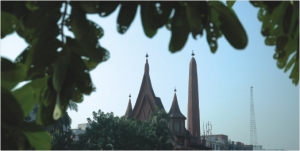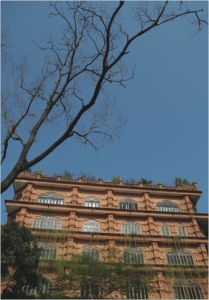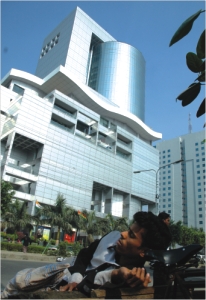
Inside
|
The bubble boys, the Green Zone and the 99% What is wrong with the privileged elite of Bangladesh, asks Asif Saleh, that they can be so indifferent to the misery and hardship that surrounds them.
We recently sent an intern from our organization to work for Ain O Shalish Kendro. Before she left, I met her in London -- a very excited twenty-something girl out to change the world. The zeal, however, soon turned into grief on October 28. Her Glasgow-residing father went to visit her in Dhaka. He was at the wrong place at the wrong time on that day. She didn't hear from him all day and night after he went shopping at Baitul Mukarram, the scene of the chaos that broke out in the aftermath of the power handover. Desperate, she started to look for him in the hospitals of Dhaka. What she saw there was a scene of mind-boggling disaster. The stench, the filth and the scene of how the patients are treated in the name of treatment was something that she did not expect. Typically, she and others like her are not exposed to this kind of scenes as they would be accessing the privileged services and hospitals. What she saw that day in those hospitals didn't even pass the very basic standard of a health care system, and what's more scary is that if this is the state in our capital city then imagine what is happening in the rest of the country. Well, guess what? That's the kind of system, or worse, that 99% of our population are forced to use. It is sad but true that, similar to health care, all the basic services that the state is supposed to provide are now so polarized that what is offered to the rich and what is offered to the middle class and poor are beyond comparison. In fact, you can't even call them services. You just have to start with the educational system to get a glimpse of this inequality. Only the rich can afford good schools and private or foreign universities, education in which leads to guaranteed highly paid jobs. Whereas a certain Abdul Karim from Kaliganj can never even dream of getting that dream job in Standard Chartered Bank with the broken English that he learnt at Kaliganj Government High School. So what does he do to break the shackles of unemployment? He sells his vita mati for a lakh or two to make his way to Malaysia to do slave labour, change his fortune and break the invisible glass ceiling -- only to be cheated by the adam bepari and return home penniless. If he is lucky to return alive, then the only remaining options require him to choose between becoming a professional mastan or a bomber for the cause of Allah. You might say that such a class struggle is there in every country. But what is different in Bangladesh is that more and more, every passing year, the gap between what's offered for the rich and what's offered for the middle class is becoming wider. Let's not even talk about the poor. Now here is the million dollar question: why is nothing being done about it? Simply put, it's because our policy makers, our industrialists, the rich and the beautiful in our society don't have to deal with this joke of a system. They either go abroad, or they go to Apollo Hospital for their physical check-ups. The all-encompassing bubble of Gulshan, Banani, Baridhara enables them to completely ignore the system (whether its education, medical, or transportation) that the 99% of our population has to use day in and day out. As a result, they never feel the need to change anything about it.
I will give you a small example of one such bubble boy. The head of one of the garments manufacturers' associations, a hot-shot arrogant garments manufacturer, in a recent meeting on compliance with his clients was making fun of how the hotel he was staying in London had such small rooms that Mr Blair should be ashamed of it. Then he went on to brag about how great the hotels are in Dhaka. Tony Blair may not provide great hotels, but basic health-care and education is free for all. While this business leader brags about Bashundhara City mall in Dhaka, he doesn't realize that 99% of the population can't afford to touch anything in there. He takes pride in the superficial surroundings of Dhaka, because the world of this other 99% is completely unknown to him. In his distorted reality from inside the "Green Zone," he sees Dhaka as a place where children get top-notch education in the international schools, and where top-class medical services are available in Apollo Hospital, and where the best restaurants with their ever elongating buffet lines are the pride of the city. If you talk about the rest of the 99% who have no access to these things you are not helping in "image building" of our country. I happened to be present in that meeting to present the side of the garment workers, and he was furious at me for this betrayal and "image termination" of Bangladesh. From London, where he was explaining to the bideshi client that £8 is actually a lot of money in Bangladeshi taka, he flew back to his zone and headed to the negotiation table to resist the "unjust" demand for raising the monthly minimum wage from £8 to £24 (which pays for a month's worth of ice cream at MoveNPick for his kid). Now let's move the focus from this bubble boy to the rest of the populace of the heavily fortified Green Zone of Dhaka. Yes, I am talking about the crowd in Gulshan and Baridhara and my abhiman (not accusation) about them. How socially aware are they? How socially responsible are they? Do they care about what's happening outside the Green Zone? Do they think they have any social responsibility? Do they realize how much impact they can have in the country if they come forward and start tackling the real issues from their position of privilege. Sameen, a colleague from Toronto, and I often lament that how come we see so many rich people, but so few donors to social causes in Bangladesh. Please disregard donating to your "desher bari," or donating for the local mosque, or zakat, or the occasional Rotary or Lions Club work. I am talking about seriously working and helping the social causes in Bangladesh that help the other 99%. Why don't we see rich people in Dhaka coming out in droves to help pay for education for Madhabi, the tortured housemaid, who was headline news a few weeks ago? Why don't we see celebrities come out and talk about how ridiculous the wage of the garments workers are? Why don't we see them donating money to rebuild villages in an Annada Prasad, a Hindu village destroyed by hate crimes, or pay the entire medical bill of a journalist Tipu Sultan or a Shafiul Haq Mithu? Why don't I hear about a rich guy donating for an income-generating activity for the affected families in Kansat? Of course, I am generalizing. But stereotyping happens for a reason.
While the Bill Gateses and Warren Buffets in the rest of the world are opening up their wallets and giving billions in philanthropy, I can't name a single rich person in Bangladesh whom I can proudly say has become the number one philanthropist in the country. However, I do hear stories about them. I do know that they can shed Tk 1,000 (equal to one month salary for a garment-worker) for a couple of tubs of ice-cream. I do know that they don't mind paying 200% tax to drive their Hummer Jeep in the dodgy streets of Dhaka. Then what am I missing? Are we Bangladeshis in general just so small-hearted that we can't think beyond our own material benefit? Not true. We did fund-raising for Drishtipat abroad for 5 years. I can take tell countless stories of Bangladeshis going beyond their means to donate. One student paid $10 every month for 6 months, saving from his McDonald's job, for the women of 71. One cab driver paid his entire week's income for Tipu Sultan with a note saying: "Beshi dite parlam na." One couple literally emptied their wallets for the Hindu victims of Annada Prasad. So what am I missing? Can anyone give me the answer? Can anyone tell me why the privileged few in Bangladesh are so reluctant to think beyond themselves? Why they never think of "the others" -- the 99%? This is my abhiman -- not accusation. I know there are exceptions. There are some angels in the Green Zone as well. It would be a disservice to them if I don't tell one such story. The story is of an organization called Sajida Foundation and Renata Limited -- a pharmaceutical company listed on the Dhaka Stock Exchange. Even in the early 1990s, Sajida was a tiny organization. It ran a garage school with 12 students in Bailey Road, Dhaka. Then in 1993, through an exceptionally generous financial arrangement, the foundation acquired 51% of Renata Limited. Using dividend income from the acquisition, Sajida began expanding its programs in micro-credit, health, and education. To give an idea of the expansion of charity: In the mid-90s, the total annual budget of Sajida was Tk 500,000. Today, it is Tk 1.25 billion, with virtually no donor support. This growth was possible because, in the early days, the dividend income from Renata had provided a strong financial backbone to Sajida. Today, dividends are a small contributor to the overall source of funds. This is just a small example of what's possible when the privileged ones become socially conscious doers as well. We can only hope that we can try to create many such stories like this one. As for our intern, her father did return after 24 hours. However, the scar of the exposure to what 99% of our population is exposed to still remains deep in her psyche. Asif Saleh is the founder of Drishtipat, a diaspora human rights organization. |


